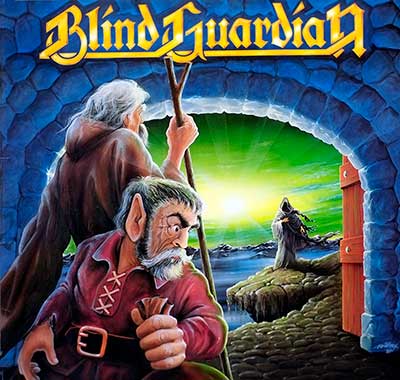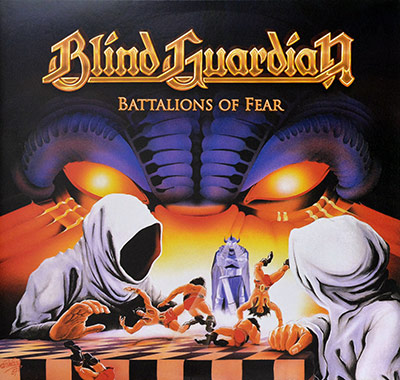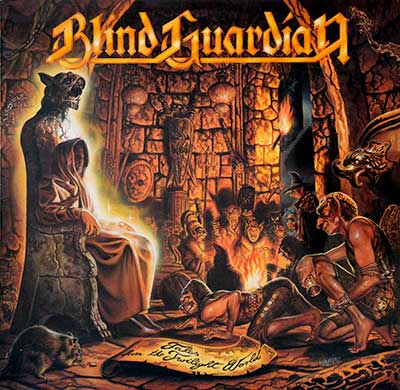Thomas "The Omen" Stauch, Blind Guardian’s original drummer, is a name etched in the annals of power metal for his relentless energy and dynamic percussion. During the 1980s, Stauch’s drumming served as the thunderous backbone of Blind Guardian’s early sound, driving their music with precision and power. His contributions were integral to the band’s rise in the German metal scene, where his blend of speed, technicality, and flair laid the groundwork for their evolution into one of power metal’s most revered acts.
The Beginnings of a Drumming Legacy
Born on 11 March 1970 in Krefeld, Germany, Thomas Stauch was immersed in music from an early age. Inspired by drummers like Cozy Powell and Nicko McBrain, Stauch developed a style that balanced technical proficiency with a raw, energetic edge. In 1984, he co-founded Lucifer’s Heritage, the band that would become Blind Guardian, alongside Hansi Kürsch, André Olbrich, and Markus Dörk. The chemistry between Stauch and his bandmates was evident from the start, and as the band transitioned into Blind Guardian in 1987, Stauch’s drumming became a defining element of their sound.
Speed and Precision: The Hallmarks of the 1980s
During the 1980s, Blind Guardian’s music was rooted in the speed metal movement, and Stauch’s drumming perfectly complemented the genre’s high-octane demands. On their debut album, Battalions of Fear (1988), Stauch’s relentless double bass drumming and rapid-fire fills brought an intensity that drove songs like 'Majesty' and 'Run for the Night.' His ability to maintain blistering tempos without sacrificing precision became a trademark of the band’s early sound.
Stauch’s drumming on Follow the Blind (1989) showcased his growing versatility. Tracks like 'Valhalla' and 'Banish from Sanctuary' featured complex rhythms, rapid transitions, and dynamic shifts that elevated the band’s music beyond the typical speed metal template. His fills and cymbal work added texture and energy to the songs, proving that he was more than just a timekeeper—he was a driving force in Blind Guardian’s sound.
Creative Contributions to Blind Guardian’s Sound
While Stauch’s drumming was fast and aggressive, it also displayed a remarkable sense of musicality. His contributions went beyond keeping time; he actively shaped the band’s compositions. On songs like 'Damned for All Time' and 'The Martyr,' his inventive use of cymbals, toms, and syncopated beats added layers of complexity to the music. His double bass technique, in particular, was a key element of Blind Guardian’s signature sound during this period, propelling their music with a relentless, almost orchestral momentum.
Stauch’s ability to adapt to the band’s evolving style was evident as Blind Guardian began to incorporate more melodic and narrative elements into their music. His drumming provided the rhythmic foundation for the band’s early experiments with epic storytelling, complementing the fantasy-inspired themes that Hansi Kürsch brought to the lyrics.
Earning the Nickname "The Omen"
Thomas Stauch’s nickname, "The Omen," reflects the power and intensity of his drumming. Whether delivering machine-gun double bass patterns or intricate fills, his playing exuded a sense of foreboding and urgency that matched the band’s dark, fantastical themes. His presence behind the drum kit was commanding, and his contributions were crucial to Blind Guardian’s reputation as a live powerhouse during their early years.
The Legacy of the 1980s
By the end of the 1980s, Thomas Stauch had cemented his place as one of the most formidable drummers in the speed metal scene. His work on Battalions of Fear and Follow the Blind set a new standard for precision and aggression in metal drumming, inspiring countless musicians in the burgeoning power metal genre. His chemistry with Hansi Kürsch, André Olbrich, and Marcus Siepen created a rhythm section that was as tight as it was explosive, forming the backbone of Blind Guardian’s sound.
The Foundation for Future Growth
The 1980s were a decade of rapid growth for Blind Guardian, and Stauch’s drumming was at the heart of their evolution. His technical skill and creative contributions provided the stability and drive needed for the band to experiment with more ambitious compositions. As Blind Guardian transitioned into the 1990s, Stauch’s drumming would become even more versatile, accommodating the increasingly symphonic and progressive direction of their music.
An Indelible Mark on Metal
Thomas "The Omen" Stauch’s work during the 1980s remains a cornerstone of Blind Guardian’s legacy. His drumming not only propelled the band to prominence but also set a high bar for rhythm in the power metal genre. Today, his contributions are remembered as a crucial part of Blind Guardian’s rise, and his influence continues to resonate with drummers and metal fans around the world.
Though his role in Blind Guardian would evolve in the decades to come, the raw energy and technical brilliance of Thomas Stauch’s 1980s drumming remain an enduring testament to his talent and dedication. From the thunderous double bass of 'Majesty' to the intricate rhythms of 'Valhalla,' Stauch’s playing was—and always will be—an essential part of Blind Guardian’s early sound.


